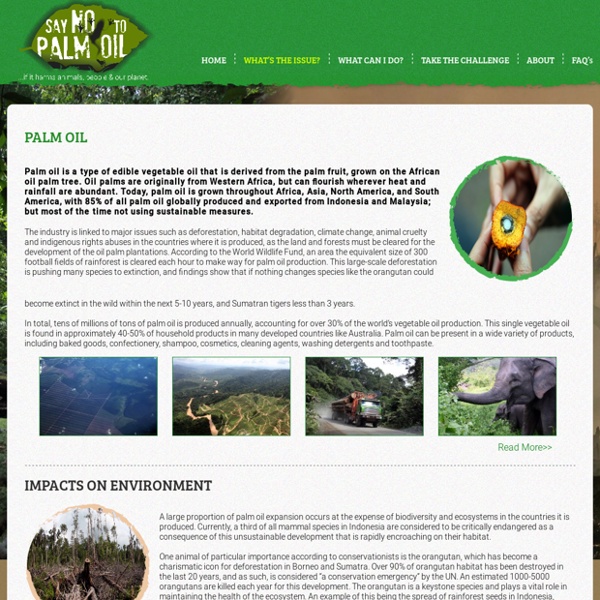Good palm oil is possible. This is what it looks like, says Palm Done Right CEO
Started three years ago by Natural Habitats, a company that produces, collects, processes and trades organic and fair trade palm oil, Palm Done Right is an education programme aimed at engaging industry, consumers, the media and other stakeholders. “Our collective aim is to raise the awareness of truly sustainable palm oil [so that] other producers that meet this highest standard of sustainability join the program, thus eventually becoming a collaboration of organic fair trade producers that can truly move the needle in impacting the palm oil industry.” What is Palm Done Right? Palm oil produced according to Palm Done Right standards – what Blomquist refers to as ‘conflict free palm’ - is produced organically, using natural pest management, multi-cropping and composting, in vertically integrated ‘farm to fork’ supply chains. Only existing crop land or degraded land is used. It also develops community programmes that focus on local infrastructure, education and nutrition. Palm oil
Palm Oil | Industries
Grown only in the tropics, the oil palm tree produces high-quality oil used primarily for cooking in developing countries. It is also used in food products, detergents, cosmetics and, to a small extent, biofuel. Palm oil is a small ingredient in the U.S. diet, but more than half of all packaged products Americans consume contain palm oil—it’s found in lipstick, soaps, detergents and even ice cream. Palm oil is a very productive crop. WWF envisions a global marketplace based on socially acceptable and environment-friendly production and sourcing of palm oil.
This is how palm oil is made
The next time you walk into a grocery store, take a moment to think about the fact that 50 percent of the items you see contain palm oil. Despite its ubiquity and familiar presence on ingredient lists, palm oil is a foreign, tropical product that most North Americans know very little about. Did you ever wonder where it comes from? Last month, TreeHugger contributing writer Katherine Martinko traveled to Honduras as a guest of the Rainforest Alliance. This is a mature palm plantation that’s reaching end of life.
Palm oil: scourge of the earth, or wonder crop?
If you happen to mention palm oil to most people outside of Asia you are unlikely to get a particularly positive reaction. Over recent years, media coverage of palm oil has typically included images of displaced orangutan and burning, degraded tropical forests. There has been a feeling that palm oil is an evil that needs to be stopped. Indeed, in some of the richer countries there have been attempts to organise consumer boycotts of palm oil products ranging from cosmetics to chocolate. Examples include France, the United Kingdom, and Australia. But there is another story about palm oil that is much less frequently heard, especially in richer countries. Rich crop, long history The oil palm tree has been cultivated as a source of food and fibre by people in western Africa for as much as 4,000 years and was harvested by our hunter gatherer ancestors for tens of millennia. Palm oil is a uniquely productive crop. The trees also have a productive lifetime of around 30 years.
THE PALM OIL EXTRACTOR – Fairtrade Africa
Profile: Kuapa KokooProduct focus: Cocoa Location: Kumasi, Ghana Type: Smallholder – 74,000 farmers Fairtrade certified since: 1996 Contact: Maybel Addy – admin@kuapakokoo.com Challenge:A majority of Kuapa Kokoo’s members own only small areas of land. As the cocoa harvest varies throughout the year — with main and light crops — these farmers cannot depend on a stable income. Solution: Traditionally, women farmers pound palm nuts in big wooden mortars. The machines crush the palm fruits and squash out the oil from the husks. Due to the investment, the palm oil process is now not only less labour-intensive, Kuapa Kokoo farmers also produce sufficient palm oil to set up different income-generating activities. Cost:In Ghana, a palm oil extractor costs 3,000 GHC (or 1,750 USD). Result:As palm oil production is traditionally done by women, the introduction of the machines has empowered women farmers especially — and more particularly widows and single.
Fair Trade Palm Oil From Ghana: The Difference Fair Trade Makes
Palm oil is an ingredient in half of all products sold in grocery stores throughout the United States. To supply the massive demand for this ostensibly cheap oil, rainforests from Brazil to Borneo are destroyed by industrial clear-cutting and strategic burning, to create arable land for homogenized palm tree plantations. Often, these plantations in developing tropical nations are run by multi-national corporations that exploit farmers and laborers, trample native land rights, and do nothing to improve workers’ communities or standard of living. Although we also use palm oil as an ingredient in Dr. Via Dr. We have created an animated video, titled “Dr. Our friends and partners in Ghana have identified Malaria prevention as the top priority of their next community project. Malaria is spread by a single mosquito bite, and causes extensive pain and suffering that prevents people from earning a living. Every $10 donated to this cause will allow us to provide a bed net to a family at risk.



